According to the World Bank national accounts data, worldwide GDP has grown from $1.373 trillion in 1960 to $85.91 trillion in 2018

At the same time, business models have been completely transformed. On comparing Fortune 500 list of companies from 1955 to the list from 2019, one can only find 10% of the companies that are still on the list.
This transformation of entire sectors of the economy across the globe have been enabled by technology. The pace of this transformation is escalating. This raises some important questions: is this wealth creation sustainable?
Wealth distribution
As I look at the topic of sustainable prosperity, another important criterion to consider is the distribution of the wealth over the past few decades. In the past two decades, we have seen major economic dislocations. We had the technology driven boom and bust in 2000 to 2002 followed by the lending driven boom and bust in 2007 to 2009.
In both these instances, policy makers across major economies responded aggressively to provide stimulus and shore up their economies. It can be argued that in both instances, the recovery has benefited a relatively smaller section of society that was already in a stronger position financially to weather the storm than the broader population. In this IMF blog, “The Declining Fortunes of the Young”, the authors raise relevant concerns and feature policy solutions.
In the past few years, this distribution of wealth has driven the polarization of society fueled by the rise of populist movements in the Americas, Europe and Asia. Many of these movements question if the transformation in business models is in their national interests.
Role of Innovation
Consumers across countries have a vast range of goods and services at their finger-tips. In many instances, business models have been altered beyond recognition. Companies like Alibaba, Apple, Google and Amazon have transformed consumers’ expectations across a broad range of sectors including entertainment, shopping, groceries, financial services and travel. This zeal for innovation has undoubtedly benefited consumers.
At the same time, it can be argued that such innovation has concentrated the channels for delivering goods and services increasingly in the hands of a small numbers of providers across industry sectors. In this NY Times article, “At Tech’s Leading Edge, Worry About a Concentration of Power”, the author highlights some of the concerns in the field of Artificial Intelligence. The common factors underpinning this innovation is cutting edge technology and access to vast amounts of consumer insights that are mined for delivering relevant products and services. The wealth that is generated in turn gets distributed to those who have the skills and talents to deliver this innovation. This unrelenting war for talent further skews the distribution of wealth in society.
Fairness: can technology help?
Executives at leading companies are already recognizing that they need to address inequalities in society. In the United States, the Business Roundtable released a Statement on the Purpose of a Corporation signed by 181 CEOs. The CEOs commit to lead their companies for the benefit of all stakeholders – customers, employees, suppliers, communities and shareholders.
I would contend that technology can play a major role in shaping these initiatives. The innovation enabled by technology that helped transform our society and created unprecedented wealth, can help share the wealth across the community. The advent of learning platforms like Udemy and Coursera makes it easier than ever before for companies to explore new opportunities. Companies can use these platforms and help up skill their communities for future opportunities. This will help develop the next generation of innovators and at the same time provide learning opportunities to a much wider audience. However, this is easier said than done. Executives need to set up the learning programs with appropriate governance models so that all stakeholders benefit from the collective investment.
The Journey Ahead
SAP offers learning and development opportunities at openSAP. Our teams continue to work with partners, educators and NGOs to help communities develop skills for the next generation of opportunities. As one example, SAP’s corporate social responsibility strategy offers Code Weeks to participants in over 92 countries. Participants join dedicated learning programs to get the digital skills required to engage and contribute to their local economy.
Courtesy: referral link
